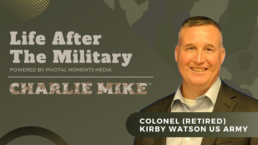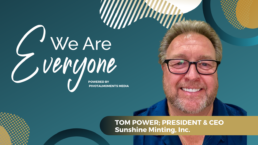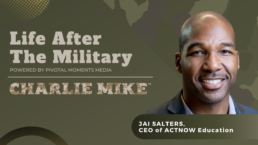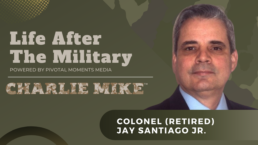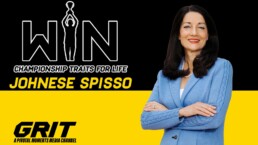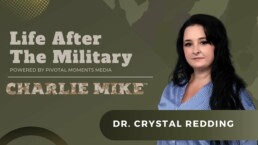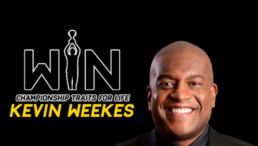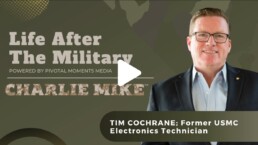Life After The Military: Colonel (Retired) Kirby Watson
Do you want to learn the lessons of what to do and what not to do IOT to have a low stress and highly successful transition from the military to the public or private sector?
Did you say “YES?

Then check out the newest Pivotal Moments Media, Life After The Military podcast with Army Colonel (Retired) Kirby Watson!
Kirby is one of the finest, most authentic, and genuinely caring leaders that our co-host, Howie Cohen, EVER served with during his 27+ year military career!
Kirby spent 33 years as an Army Signal Officer and candidly discusses everything he did right and wrong
- what he did wrong while transitioning – overscheduling interviews, not focusing on one area of need, not properly informing colleagues of the transition
- what he got right – focusing on finding a good team, taking advantage of the TAP program, being honest about his health state, sourcing colleagues and job applications and honest company reviews through his LinkedIn network, carefully preparing for interviews
- Discusses how he transitioned out as a veteran by taking the initiative to seek out mentors and carefully going through each step leading up to the job search process
Howie, Lee and Kirby implore listeners to
- Be honest about medical needs during the transition
- Put yourself and your needs (and the needs of your family) first
- Connect with colleagues on LinkedIn and extensively research positions
- Focus on team building rather than resume building
Kirby also shares advice and guidance for veterans looking to enter the government contracting space and what mental fitness means to him
Show Notes:
00:00 Lee introduces Kirby Watson, a decorated 33-year Army veteran
3:08 After 33 years, Kirby discusses what he did to prepare to transition – focusing on the TAP programs and educational opportunities available at the Pentagon
6:44 Kirby gets specific about what he did wrong while transitioning – overscheduling interviews, not focusing on one area of need, not properly informing colleagues of the transition
10:46 Howie relays an important point, that transitions are just as important for long-time servicemembers once they believe their military career has ended
14:09 The discussion shifts to the need for servicemembers to sometimes put themselves first – a difficult task for those who are trained to serve others
17:48 Kirby discusses what he got right – focusing on finding a good team, taking advantage of the TAP program, being honest about his health state, sourcing colleagues and job applications and honest company reviews through his LinkedIn network
22:48 The group recaps Kirby’s most important steps during the transition – owning the process, taking advantage of LinkedIn, starting as early as possible
27:45 Kirby tees up his final important steps during transitioning: careful preparation for interviews
32:40 Howie shares parallels between Kirby’s story and his own, imploring listeners to speak up for themselves and their health during their transition
37:28 Kirby shares advice and guidance for veterans looking to enter the government contracting space: ask questions and seek to understanding the language of the place you’re at, find a good team and constantly expand it
45:03 Lee relates to Kirby’s lessons on the extreme importance of networking/network-building
48:00 Howie implores veterans transitioning to learn about basic business principles for for-profit companies, noting the difference in the employment model of the military
52:18 The discussion shifts to business acumen over time
54:36 Lee gives Kirby his created book title
56:40 Kirby answers the question, “what does mental fitness mean to you?” – surrounding yourself with good people, maintaining a sense of camaraderie, and being careful about what defines you
1:07:13 Lee and Howie close the show, “never verbalize a negative thought”
Supporting a Multi-generational Team with Tom Power
“Managing a company is like flying an airplane, you know where you want to go, but you’ve always gotta make adjustments depending on which way the wind is blowing.” Joining this episode is Tom Power, President and CEO of Sunshine Minting Inc., the leading domestic and global supplier of precious metal and base metal mint products. Power chats with Jenn about his experience at the helm of the company including his approach as an ‘intrapreneur,’ the importance of allowing yourself the space to make mistakes and the true value of establishing community and a supportive culture among a multi-generational team. And, of course, he shares his definition of mental fitness!

GUESTS SOCIAL MEDIA LINKS:
LinkedIn: https://www.linkedin.com/in/tom-power-16b3014
Sunshine Minting Website: http://www.sunshinemint.com/
Show Notes:
00:00 Introduction to Tom Power and Sunshine Minting, Inc.
4:00 Tom shares what led him to work for the Sunshine Minting, Inc. company, beginning with the historical NAFTA agreement between the US and Canada in the 90’s
7:18 Jenn asks Tom, given his extensive experience in leadership, “how would you define mental fitness”?
10:59 Tom discusses how the company structure allowed him to develop himself as an ‘intrapreneur’, allowing him the freedom to make mistakes as well as setting up his confidence
12:19 Jenn discusses the dynamic landscape of the workforce, prompting a discussion about how there are currently four generations working together in the overall American workforce
17:47 Tom and Jenn discuss what they believe is a happy medium between the machismo-based definition of mental fitness, and the more empathetic and inclusive definition
23:15 The discussion shifts to the importance of putting together an effective team, and how the concept of accountability sometimes differs from generation to generation
26:00 Jenn and Tom discuss effective techniques they’ve used to learn in order to community effectively with multi-faceted teams
29:04 Tom discusses how he built a circle of trust to combat the self doubt he experienced after becoming a CEO, fortifying his mental fitness
31:00 Tom shares incredibly good advice for other company leaders to address mental awareness and wellness in the workplace – “establish the right culture”
34:53 Tom leaves lasting words for the PMM audience
Life After the Military: Jai Salters
Do you know who David Goggins is?
Have you read or listened to his book Can’t Hurt Me!?
Have you seen/listened to any of his podcasts with Joe Rogan or Ed Mylett or the other great interviews he’s conducted over the last 3-4 years?

If you answered Yes to any of these questions, I want to introduce you to the David Goggins of Veteran Service Organizations: Navy Officer Jai Salters, founder of ACT NOW EDUCATION!
If you answered NO to any of these questions, then check out David Goggins on YouTube, read or listen to his book, Can’t Hurt Me, then listen to or view this Pivotal Moments Media podcast episode of Life After the Military with Jai Salers as our guest! Jai and his story is amazing!
Learn how Jai consistently did the following:
– Overcame repeated adversity in his childhood and his life as a child in the foster care system and built a life of pure grit and resilience
– Pursued education as a way to better himself
– Committed himself to help active duty service members, veterans, military spouses and family members thrive and successfully transition to life after the military by creating and leading ACT NOW EDUCATION
– Flexed his mental fitness muscles
– Never hesitated to seek help when he needed it
Links
LinkedIn: https://www.linkedin.com/in/jai-salters/
FaceBook/Meta: https://www.facebook.com/search/top?q=jai%20salters
ACT NOW EDUATION: https://www.actnoweducation.com/
ACT NOW EDUCATION Facebook Group: https://www.facebook.com/groups/ACTNOWEDUCATIONGROUP
InstaGram: @jai_salters
Show Notes:
00:00 Lee and Howie introduce Jai to the PMM audience, noting his work with ACT NOW EDUCATION, an organization that has helped over 14,000 military members and families with educational resources
3:03 Jai discusses what motivated him to create the organization while he was an active duty officer, starting with a series of awkward presentations
8:27 Jai tells the story of how his personal family history affected his early years and eventual enlistment into the military on September 11, 2002
11:00 Howie and Jai discuss the David Goggins story noting some of the parallels between he and Jai’s backstory
16:11 Jai shares very intimate details of his early beginnings and experiences in the foster care system and how it influenced his will to overcome painful circumstances
23:23 Lee and Jai discuss how Jai’s experience has equipped him to impact others, and to see the signs of a hurting comrade
33:27 Howie shares an anecdote of an important comrade in his life
37:08 Jai discusses his mentorship work with organizations like Veterati and ACP, and the process of onboarding mentees
43:37 Lee, Jai and Howie urgently implore all transitioning veterans to ‘do it NOW’; get started on the transition process ASAP
55:05 Howie tells the story of how a chance encounter at a networking event led to his compensation package being almost doubled
57:32 Jai tells the audience some of what he does to strengthen his mental fitness – positive self talk, taking a mental pause, enlisting people who can help him with the problem, etc.
1:06:15 Lee transitions to Jai’s prospective book title, and Howie takes a stab at it also!
1:09:54 Show closing
Applying Positivity with Eliza McDevitt
“If we only focus on the negative, we are missing a whole half of the human experience.” In this episode, we are joined by Liza McDevitt, AAMS® and Financial Advisor at Raymond James & Associates, Inc., for a conversation about Applied Positive Psychology.

“If we only focus on the negative, we are missing a whole half of the human experience.” In this episode, we are joined by Liza McDevitt, AAMS® and Financial Advisor at Raymond James & Associates, Inc., for a conversation about Applied Positive Psychology. Liza explains how her experience in business led her to earn a Master’s in Applied Positive Psychology and how she utilizes it in her current role today working with financial clients. On top of that, she shares some positive problem solving advice for us all to follow!
**Raymond James & Associates, Inc. member New York Stock Exchange/SIPC. Any opinions are those of Liza McDevitt and not necessarily those of Raymond James.
GUESTS SOCIAL MEDIA LINKS:
Twitter: https://twitter.com/little_lizajane
LinkedIn: https://www.linkedin.com/in/elizajanemcdevitt/
SHOW NOTES/”KEY TAKEAWAYS”:
00:00 Jenn opens the show, and Eliza introduces herself to the PMM audience, detailing how she began in business and how it lead her to earn a Masters in Applied Positive Psychology
5:23 Eliza explains what Applied Positive Psychology is, noting its stark difference from classical psychology
11:40 Jenn asks how positive psychology is utilized in Eliza’s current role as a financial advisor
17:00 Eliza explains her definition of the concept of mental fitness
18:46 Eliza discusses how she keeps her personal perspective in check when working with financial clients, regarding what is best for their goals
24:36 Jenn asks, “How can we apply positive psychology when it comes to mental fitness?”, and Eliza puts Jenn on the hot seat!
28:08 Eliza gives the audience some positive problem solving advice and Jenn closes the show
QUOTES MENTIONED:
“Psychology is really the field of science that measures the intangible, our thoughts and emotions, which then lead to our behaviors.” – E
“The biggest things that are stressors for people are finances, and finances.” – J
“If we only focus on the negative, we are missing a whole half of the human experience.” – E
“Emotions serve a function.” – E
“No emotion is meant to last forever, it’s supposed to tell you something about what’s going on in your environment, and oftentimes your emotion will feed your behavior.” – E
“…Mental fitness is the ability to tackle whatever life challenges are in front of you through cognitive skills” – E
“What are those things in the mental space that we can work on that are gonna help us conquer life challenges that come our way?” – E
“You as an individual have the power to curate positive emotions, and make change in whatever facet of your well being that might be lacking…” – E
“Are we doing things that generate positive emotion in our day to day lives?” – E
“Hope is a very powerful emotion, as are joy, awe, and connectedness.” – E
“We do have shorter attention spans these days.” – J
“Whats holding me back? Is there some way I’m thinking about things that isnt’ a perspective that’s helping me? If I shift my perspective will that help me shift my emotions and behaviors…?”
Life After The Military: Jay Santiago Jr. Colonel (Retired)
Does anyone ever say “Thank You for your service” to you when they know you serve or previously served in the military? Ever hear a response like, “Thank You! You are worth it!” Well, you will hear it in this Life After the Military episode!

This episode of Life After the Military, features Army Colonel (Retired) Jay Santiago – who represents three (3) generations of Army Officers (Jay, his father, and his two sons).
Jay provides his insights into the transition process, shares his lessons learned, and describes how he treated it as a “mission.”
Unlike most transitioning senior officers and noncommissioned officers, Jay is still with the same company, Worldwide Technologies, that he joined over 11 years ago. Learn about the transition preparation and criteria Jay applied to make such a great choice!
00:00 Lees introduces Jay Santiago, Jr.; Jay starts off the interview with very detailed advice for a smooth transition
08:37 Jay lists the things he did well during his transition, noting that the most important thing was to take the time to think, to understand the need, and to develop the right connections
13:20 Howie and Jay implore you to consider how important the transition will be for your family
18:00 Howie and Jay get specific; Howie drops a big tip about health insurance premiums for transitioning vets
20:48 Jay discusses how he carefully chose the company he transitioned into, World Wide Technology, and how he has been progressing with the company for the last 10 years
36:04 The extreme importance of community within and throughout any industry
40:55 Lee asks, “What advice do you have for the specific trajectory of government contracting?
44:26 Howie shares what went wrong during his experiences in contracting noting how a good mentor saved his career
51:35 The discussion shifts back into the need for developing relationships, asking for help, and becoming a lifelong learner
1:03:54 Personal mission and identity aren’t defined by military titles
1:08:43 Howie’s favorite part of the show
1:14:06 Jay details how following his faith and staying purposeful in a community adds significance to his life and aids with mental fitness
1:21:09 Howie closes the show – “you reap what you sow”
Championship Traits For Life - UCLA Health President Johnese Spisso, RN, MPA
We say at the top of every episode that we interview champions and trailblazers. While our show has a strong sports focus, we know that to learn to truly “WIN”, we had to look just beyond athletics. Today’s guest is a champion in her field, a trailblazer in her field, and one of the most influential leaders in her field – and I guarantee you will learn something from listening to her today.

This week’s guest, Johnese Spisso, RN, MPA, is one of the top clinical leaders and one of the top most influential Women leaders in America. Her life has been dedicated to service for others and her journey has taken her from starting as a Registered Nurse to becoming the current President of UCLA Health, the CEO of the UCLA Hospital System and the Associate Vice Chancellor of UCLA Health Sciences.
In short everyone – listen up! Johnese is about to gift us with 45 minutes of knowledge!
A Discussion of Atlas of the Heart with Beth Shaha, Part 5
Sandy and Certified Master Life Coach, Beth Shaha continue the discussion of Atlas of The Heart by Brene Brown. This discussion addresses key points of the final chapters including the need for belonging, showing up and being your true self, and cultivating meaningful connections.

00:00 Sandy opens the show by re-introducing the author, Brene Brown, and her book Atlas of the Heart
1:58 Beth Shaha discusses an instance of positive influence based on the theme of Chapter 9, belonging
7:29 Sandy shifts the discussion to Chapter 10: When Our Hearts Are Open, focusing on family dynamics and integrity in communication
13:38 Quick anecdotes on self-betrayal
18:23 Sandy quotes Brene Brown: “One of the bravest things you could say to someone is, “that hurt my feelings.’”
20:29 Beth discusses the concept of ‘flooding’, a product of being deeply blended with an emotion, and how important it is to disarm yourself when this occurs
25:28 “Ask yourself, do I have enough information to freak out?”
27:27 Sandy opens up a quick discussion on intentionality
29:19 Beth shifts the topic to Chapter 11 – the balance between contentment and satisfaction
33:54 The discussion moves onto Chapter 12: Places We Go When We Feel Wronged and Chapter 13: Places We Go To Self Assess – pride vs. hubris
37:11 Beth and Sandy summarize the final chapters of the book highlighting the fact that emotional intelligence rests within our bodies, not just the mind
41:21 Sandy shares a sweet anecdote about how she connected with a new neighbor
44:48 Sandy and Beth close the series with wise words from Brene Brown’s mother – “Don’t look away, don’t look down, don’t pretend not to see hurt. Look people in the eye, even when the pain is overwhelming; and when you’re hurting and in pain, find the people who can look you in the eye.”
Life After The Military: Dr. Crystal Redding
Crystal is a clinical psychologist who supported the Joint Special Operations Command, America’s premier counter-terrorism force.

Crystal is a clinical psychologist who supported the Joint Special Operations Command, America’s premier counter-terrorism force.
This episode focuses on how Dr. Redding:
-Treats super highly skilled service members.
-Likens the journey of working with a therapist as a “sherpa”, helping humans climb the mountain to achieve mental wellness and fitness
-Discusses stigmas surrounding therapy for service-members, noting that the history of therapy includes labeling people
-Shares her view of modern view of psychology which must focus on help with everyday life and tasks
-That the first 3 years out of the military have the highest rates of suicide
-She describes the story of a military sniper who needed help with anxiety – how the sniper already knew how to use breathing queues due to their training, and how that was utilized in their diagnosis
-“Its ok to say, I need someone to have my six on this”
-“Leadership is key” – Dr. Redding explains how great leadership can assist healthcare providers by providing confidential recommendations and pushing service members to get help without fear of consequences
00:00 Lee introduces the audience to Dr. Crystal Redding
3:28 Dr. Redding describes her experience as a clinical psychologist for the Joint Special Operations Command
6:27 Dr. Redding talks about the stigmas surrounding therapy and gives a brilliant analogy of therapy and mountain climbing
10:21 Howie explains the Joint Special Operations Command, America’s premier counter-terrorism force, giving context to Dr. Redding’s experience as a psychologist
12:20 Dr. Redding details her process for helping a soldier with their mental fitness
19:42 Howie and Lee get real about Howie’s experiences with mental health challenges
23:58 Dr. Redding addresses the serious confidentiality concerns of service members
32:18 Howie asks Dr. Redding – how can veterans take care of themselves?
33:45 Dr. Redding discusses how military skills can be translated and applied as healing tactics
37:45 Howie discusses how transitioning veterans sometimes don’t seek help
41:14 The conversation shifts to the incredibly important issue of problematic veteran transitions and its relation to veteran suicides
49:58 The ebbs and flows of mental fitness
55:12 Lee gives Dr. Redding her prospective book title and asks the final question
1:09:00 Dr. Redding tells us how she flexes her mental fitness by having clear boundaries
1:06:50 Show closing
Championship Traits For Life - Kevin Weekes
Growing up – we all dream of being pro athletes at some point. We all dream of making a heroic last second play or reaching memorable milestones on our chosen field of sport. As we get older, we realize that making an impact in the game isn’t limited to just accomplishing the dreams of our youth. This week’s guest has and continues to impact the game on a daily level both on and off the ice.
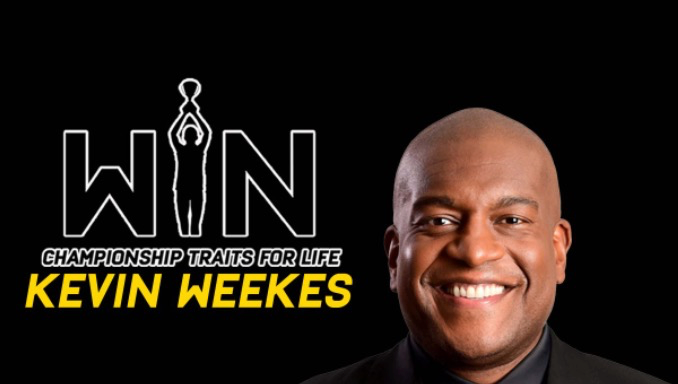 Kevin Weekes played over 350 games in the NHL between the pipes as a goaltender. Following his playing career, Kevin became a trailblazer in business (most notably with his company NO5HOLE), and in broadcasting – where he currently serves as an analyst for the NHL on ESPN and the NHL Network.
Kevin Weekes played over 350 games in the NHL between the pipes as a goaltender. Following his playing career, Kevin became a trailblazer in business (most notably with his company NO5HOLE), and in broadcasting – where he currently serves as an analyst for the NHL on ESPN and the NHL Network.
But beyond business and broadcasting, Kevin has been an inspiration to countless individuals as someone who not only wants to have a positive impact on the game we love, but more importantly – the people surrounding the game.
Life After The Military: Tim Cochrane, former Marine Corps Electronics Technician
In this week’s Pivotal Moments Media Charlie Mike Channel episode of Life After the Military, meet former Marine Tim Cochrane!
Tim discusses his life’s journey from the floor of the New York Stock Exchange as an electronics technician to American Corporate Partners (ACP), a national nonprofit organization focused on helping returning veterans find their next career through one-on-one mentoring, networking and online career advice and his current work with Tenova, LLC and Hire Military.

Howie, Lee and Tim discuss the following:
- A deep dive on the negative environmental factors surrounding veteran suicide
- Discussion of Tim’s phenomenal work with HireMilitary
- Discussion on building grit and determination through overcoming adversity
- The beginnings of the ACP
Social Media:
LinkedIn: https://www.linkedin.com/in/timothy-cochrane977/
Facebook/Meta: https://www.facebook.com/profile.php?id=100072230057762
Twitter: https://twitter.com/TimCochrane1
HireMilitary: https://hiremilitary.us/
Tenova LLC: https://www.tenovallc.com/
American Corporate Partners: https://www.acp-usa.org/
00:00 Lee introduces Tim to the Pivotal Moments Media audience
2:38 Tim talks about his experience transitioning out of the Marines to the New York Stock Exchange as a technician in the 80’s
6:07 Howie mentions American Corporate Partners (ACP), an organization that mentors transitioning veterans for the corporate world
11:13 Tim describes his journey from the New York Stock Exchange to present
16:04 Lee quotes David Goggins, “don’t stop when you’re tired, stop when you’re done”
19:56 A discussion on grit and responsibility
25:51 Tim tells the audience how ACP started, and how the org works to help transitioning veterans
33:21 The discussion shifts to the incredible importance of finding purpose and value in daily work
37:25 Howie and Tim get real about veteran suicide
51:08 Tim talks about his business history in NYC and how he built a tailored strategic retention system for veterans within ACP
1:02:23 Howie discusses the current landscape of veteran transitions
1:07:51 Lee gives Tim the title for his book
1:10:04 Tim tells the audience how he flexes his mental fitness

